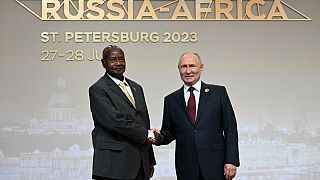African Union
Russian President Vladimir Putin said the trade turnover between Russia and African countries had increased by almost 35% in the first half of 2023 despite international sanctions and the fallout from the COVID-19 pandemic.
Speaking at a trilateral meeting with the Chairperson of the African Union, President of the Union of Comoros Azali Assoumani, and the Chairperson of the African Union Commission Moussa Faki Mahamat, Putin said "despite the difficulties related to the coronavirus pandemic and the imposition of illegal sanctions against Russia, it was possible to ensure the growth in the pace of trade and economic ties" with African countries.
Putin added last year, "the volume of mutual trade amounted to about 18 billion dollars."
"In the first half of this year, the trade turnover increased by almost 35%," Putin noted.
"Russia continues to be a reliable supplier of food to Africa," he added, saying that in 2022, Russian exports of this group of goods had amounted to 4.7 billion dollars."
Some African leaders arrived in Russia for a summit with Putin as he seeks allies amid the military operation in Ukraine, while the Kremlin accused Western powers of “outrageous” efforts to pressure other African heads of state not to attend.
Putin has billed the two-day summit that opens Thursday in St. Petersburg as a major event that would help bolster ties with a continent of 1.3 billion people that is increasingly assertive on the global stage.
But Azali Assoumani told Putin during the meeting that they were "not going to close our eyes to the issue between Russia and Ukraine, because these are two countries with which we have partnerships, and we can see the negative consequences around the world, specifically in Africa."











01:00
Russian minister found dead hours after being dismissed
01:03
Russia becomes first country to recognise Afghanistan's Taliban government
01:10
At least three killed after AU military helicopter crashes in Somalia's Mogadishu airport
01:14
Mali and Russia sign deal on nuclear energy during Goïta's Moscow visit
01:09
Iranian Foreign Minister Abbas Araghchi seeks Russian support from Vladimir Putin
00:57
Mali’s Goïta visits Moscow as Africa corps replaces Wagner in fight against Jihadists